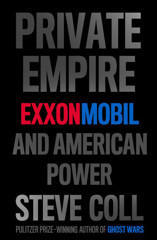
Private Empire
ExxonMobil and American Power
کتاب های مرتبط
- اطلاعات
- نقد و بررسی
- دیدگاه کاربران
نقد و بررسی

Starred review from April 1, 2012
A thorough, sobering study of the pernicious consolidation of Big Oil. With admirable restraint, New Yorker contributor and two-time Pulitzer winner Coll (The Bin Ladens: An Arabian Family in the American Century, 2008, etc.) demonstrates how the merger of Exxon and Mobil has allowed the company to wield more power and wealth than even the American government, in the manner of John D. Rockefeller. Exxon had functioned as an independent corporate state since its antitrust breakoff from Standard Oil in 1911, and was ranked by profit performance in the top five corporations from the 1950s through the end of the Cold War. With the catastrophic spill of the Valdez in Alaska in 1989, the network of secrecy and internal security within Exxon was exposed but hardly tempered. The iron chief who emerged from the crisis, Lee Raymond, reappraised risk and security within the organization and took a hard line against efforts to extract from it punitive damages. Moving the headquarters to Texas in 1993, the company retrenched in its nose-thumbing determination to encourage and supply America's thirst for oil, casting around at more far-flung spots in the world that could provide the crude--such as where Mobil held attractive assets, in places like West Africa, Venezuela, Kazakhstan and Abu Dhabi. The Exxon-Mobil merger in 1999 created a global behemoth and also provoked small wars at drilling spots where the poor and disenfranchised deeply resented the foreign workers on native soil and disrupted the extraction by violence and insurgency. Raymond and his cohorts' cynical spin on the denial of global warming and the role of the burning of fossil fuels makes for jaw-dropping reading, as does the company's cunning manipulations of the war in Iraq to garner an oil deal. The Obama administration's emphasis on renewable energy sources and environmental concerns has barely challenged the formidable political power of Big Oil. Leaks, reserves, PACs, hydrofracking, bloated corporate profits and more: all pertinent concerns nicely handled by Coll in this engaging, hard-hitting work.
COPYRIGHT(2012) Kirkus Reviews, ALL RIGHTS RESERVED.

May 15, 2012
Pulitzer Prize-winning journalist Coll (Ghost Wars) combines a corporate history of the world's biggest energy company with a survey of energy geopolitics. He begins with the Exxon Valdez oil spill in 1989, suggesting that the ongoing public criticism it generated fostered a corporate culture that is conservative, defensive, highly disciplined, and focused on cost and efficiency. While Coll covers corporate leadership and the Mobil and XTO mergers, he concentrates on the company's relentless pursuit of replacement oil reserves, its tactics to mitigate threats from environmentalism and alternative fuels, and its attempts to influence government policy. He follows the company's maneuvers in politically unstable parts of the world such as Africa and Indonesia and shows how it has coped with nationalism in Russia and Venezuela. He closes with BP's Deepwater Horizon debacle and a summary of where the United States stands today with regard to the environmental and economic costs of fossil fuel dependency. VERDICT In a very long work, Coll manages to keep his text clear, informative, and at times riveting. Highly recommended for students of the energy economy as well as for motivated general readers. [See Prepub Alert, 11/21/11.]--Lawrence Maxted, Gannon Univ., Erie, PA
Copyright 2012 Library Journal, LLC Used with permission.

Starred review from May 15, 2012
Coll is a Pulitzer Prizewinning journalist and author of the best-seller Ghost Wars (2004), an in-depth account of CIA activity in Afghanistan from the time of the Soviet invasion to the aftermath of the attacks on the World Trade Center, and six other books. His latest is a thorough examination of ExxonMobil, a direct descendant of the 1911 breakup of Standard Oil, one of the most lucrative multinational companies in the world and the most successful oil company by a considerable margin. His account begins with the 1989 Exxon Valdez oil-spill disaster and moves quickly to the years 19992005, during which the company was headed by CEO Lee Iron Ass Raymond. Raymond, a friend of Dick Cheney's, effectively led ExxonMobil to produce the highest yearly profits of any company in history during a time when rising energy prices hit ordinary Americans in the pocketbook. Raymond used his influence to lobby hard against climate-change initiatives and any attempts at governmental regulatory action that would protect the environment. This deeply researched volume includes stories of kidnapping, pirates, politics, business, and some history.(Reprinted with permission of Booklist, copyright 2012, American Library Association.)

























دیدگاه کاربران